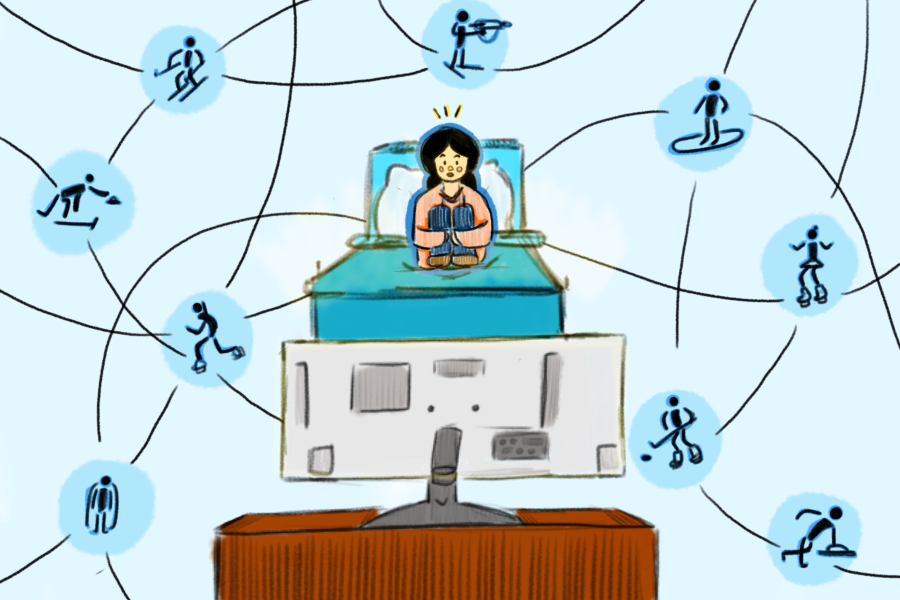Non-sports enthusiast mesmerized by the Olympics
The Winter Olympics took place in Beijing from Feb. 4-20. The Sidekick communications manager Varshitha Korrapolu writes about how much the Winter Olympics has influenced her since she started watching them in 2014.
February 25, 2022
I was born in America and have lived here my entire life. One thing that I have noticed over the years is how much Americans obsess over sports.
Sports are such an integral part of cultures across the world, not just in America. But for some reason they never really clicked with me. I never understood the hype around major sporting events such as the Super Bowl. It just appeared as football geeks, in other words commentators, using terminology that I did not care to learn about.
When people tell me that they support a particular team or an athlete, I would just think that’s good for them. Once again, I did not understand the fangirling nature of these kinds of people.
Why are people so connected to seasoned athletes they see on TV? What is so great about people being good at shooting baskets, swinging a bat or scoring goals? Is it really worth my time to watch these people?
However, in 2014 when my dad turned on the TV, the Sochi Winter Olympics came on. Nine-year-old me was instantly captivated. The vivid colors, the music, the presentation of athletes. The meaningful interviews, analysis that is not filled with sports jargon. The smiles of success, words of encouragement, tears of defeat.
As someone who was never a fan of idealized, iconic sports like football, soccer or cricket, the Olympics have a special kind of appeal to me.
People are captivated by emotions since they are naturally social and empathetic. While watching the first Olympics, I watched several ice skating performances from ice skaters around the world such as American figure skater Gracie Gold and Korean figure skater Yuna Kim.
Not only was I watching their performances, but I was learning their stories and noticed their facial expressions before, during and after their performances. I connected to the satisfaction of the skaters after finishing flawless performances as it resembles the same feeling as completing a taekwondo form with excellent power, snap and pop.
When athletes get injured, the injuries become significant obstacles to their performances. However, the way every single athlete faces injuries and overcomes them is unique. Learning how other people handle challenges has enabled me to not be hard on myself and keep pushing through.
While I was watching the 2018 PyeongChang Winter Olympics, I learned that former U.S. Olympic snowboarder Shaun White experienced facial and lung injuries in October 2017 while training in New Zealand, resulting in 62 stitches. White was flown to a nearby hospital to be treated. Even though this was briefly before Olympic qualifications, which occurred in January 2018, White did not let this mitigate his performance and he was eligible for the Olympics. I learned that his love for his sport is what allowed him to go with the flow and take a risk.
More recently during the 2022 Beijing Winter Olympics, I watched U.S. Olympic skier Mikaela Shiffrin not being able to finish the giant slalom and slalom events on TV.
I saw the frustration in her eyes when she fell on her side during the giant slalom. I saw even more frustration when Shiffrin was 10 gates through the slalom course and lost balance. Shiffrin sat beside the racing area and I saw her mom comforting her upset daughter. Even the most talented people experience hiccups in their fields of expertise. But ultimately, I learned that it is important to accept your emotions and situations and learn from them.
Athletes that are 17 years old, the same age as me, have shined as some of the youngest competitors in the Olympics. They serve as a role model to me. They show me that young people are just as capable of making their dreams a reality, just like then 17-year-old U.S. Olympic snowboarder Chloe Kim won gold in the halfpipe event at the 2018 PyeongChang Winter Olympics.
Even though I don’t understand all the sports lingo that the journalists and commentators use, the Olympic experience is a good one. Watching the Olympics in person is next on my bucket list.
Follow Varshitha (@varshitha1128) and @SidekickSports on Twitter.











